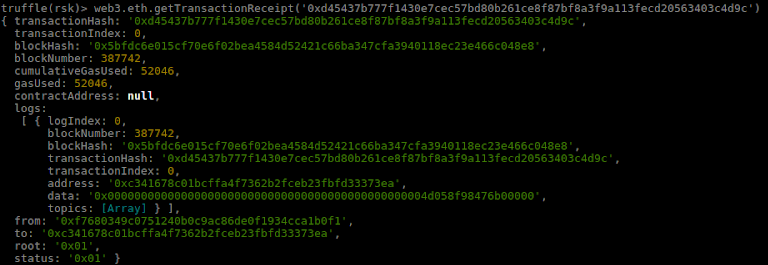Interact with Smart Contracts
Interacting with the Contract
Syntax Simplification
With the address given by Truffle’s migration, and with the ABI of the contract, we create an instance of it so the syntax is is easier for handling the functions. To do this, after we deployed it, we write
truffle(rsk)> var cfToken = web3.eth.contract(CoinFabrikToken.abi).at(CoinFabrikToken.address)In case the contract was already deployed, and knowing its address and ABI, we can just simply do
truffle(rsk)> var cfToken = web3.eth.contract(‘Contract_ABI’).at(‘Contract_ADDRESS’)Where Contract_ABI is the compressed in-one-line ABI and Contract_ADDRESS doesn’t need explanation.
We have created 2 accounts before, and now we rename them for convenience
truffle(rsk)> var acc0 = web3.eth.accounts[0]
truffle(rsk)> var acc1 = web3.eth.accounts[1]acc0 is the one that deployed the contract. Acc0 was added to the truffle.js and node.conf configuration files.
Ownership Control
We will first test the ownership function of our contract using the library that we’ve discussed.
If we call the getON function from any account, given that it’s public and hasn’t any ownership issues, we get
truffle(rsk)> cfToken.getON()
''Now, the setON function has an ownership property. Any transaction made from a different account will be dismissed. We see for instance, that trying to sign the contract with my name from acc1 will not change its value.
truffle(rsk)> cfToken.setON('Andres Bachfischer', {from: acc1})
0x5f115190b60238240bedf36d1c5bb69a443a0f8ee971b0fc40fe5ca9c727d47c
With the transaction’s hash we see that the returned value was false and the function was not executed properly. Calling the getON function again, we see that the variable didn’t change its value.
Signing now the same transaction but from the owner’s account acc0, we get a status ‘0x01’ and the function is correctly executed.
truffle(rsk)> cfToken.setON('Andres Bachfischer', {from: acc0})
0x0c894fa7e5369573fb14addeaed4cd9d5b6cd1425cb4eeeae16cb4e1fa8e0364
Calling again the function getON, we see that the ownership library worked as we hoped it would.
truffle(rsk)> cfToken.getON()
Ownable.sol also has a function that allows us to change the owner of the contract to another address. We’ll not use it. Nevertheless, its usage is the following
truffle(rsk)> cfToken.transferOwnership(acc1, {from: acc0}) With that, acc1 would be the new owner of the contract.
Let’s move on to the Token.
Token operations
The first thing we do is to check if the balances of the Token were correctly assigned in the creation of the contract.
We check our balances on each account like this:
web3.fromWei(cfToken.balanceOf(acc0).toString(10)) // = ‘1000’
web3.fromWei(cfToken.balanceOf(acc1).toString(10)) // = ‘0’So we can see that all the tokens were correctly assigned to our initial account.
The first transaction that we’ll be doing is transferring some tokens to the second account, acc1, three times.
To do so for the first transaction
truffle(rsk)> cfToken.transfer(acc1, web3.toWei(88.8), {from: acc0})
0xd45437b777f1430e7cec57bd80b261ce8f87bf8a3f9a113fecd20563403c4d9c
truffle(rsk)> web3.fromWei(cfToken.balanceOf(acc0).toString(10)) // = '733.6'
truffle(rsk)> web3.fromWei(cfToken.balanceOf(acc1).toString(10)) // = '266.4'
We see that tokens taken from our deployment account were the same amount as the ones received in the acc1 .
With the StandardToken contract we also get allowances permissions to spend tokens on behalf of a certain account, in this case, acc1. If we want to do this before getting the approval, the transaction will fail (status ‘0x00’)
truffle(rsk)> cfToken.transferFrom(acc1, acc0, web3.toWei(5), {from: acc0})
0x5cee7cf60849283a0088d71483a606ba2101b500e13f972abada4f75781596bf
After checking that acc0 is not allowed to send from acc1
truffle(rsk)> web3.fromWei(cfToken.allowance(acc1, acc0, {from: acc0}).toString(10)) // = '0'We authorize acc0 to spend 10 tokens in the name of acc1, from a transaction made by acc1
truffle(rsk)> cfToken.approve(acc0, web3.toWei(10), {from: acc1})
0x6e1a202f4ca7f43dfb28034952d54a572993b986a55857790aa51854afbc1fb4
In the output log, we see that the function was completed successfully with true and the log shows the amount allowed to acc0 for spending. Checking with allowance
truffle(rsk)> web3.fromWei(cfToken.allowance(acc1, acc0, {from: acc0}).toString(10)) // = '10'
Now if we execute again the spending transaction
truffle(rsk)> cfToken.transferFrom(acc1, acc0, web3.toWei(5), {from: acc0})
0x41f750eabb6e0d3ab576aac0333b0d337ca61808aae1eeafa9d8e2a0b81b979bwe get a successful transaction with status ‘0x01’.

Checking the balances again
truffle(rsk)> web3.fromWei(cfToken.balanceOf(acc0).toString(10)) // = '738.6'
truffle(rsk)> web3.fromWei(cfToken.balanceOf(acc1).toString(10)) // = '261.4'
Lastly, if we sign a transaction calling a function that’s not available, our fallback function will be called. Signing a transaction like
truffle(rsk)> web3.eth.sendTransaction({from: acc0, to: cfToken.address})
0x4106a287fc60669bf9682a73ec4c457b094c086ec7408a5dea95d200688c4ee9
Will return us a log whose data represents the string “Error 404: Function not found” in hex
( '0x00...00204572726f72203430343a2046756e6374696f6e206e6f7420666f756e64203a50').Our last function, that we are not going to execute for obvious reasons, is the suicide function. We need the contract not to be destroyed in order to show the transactions. To call it, the owner should do
truffle(rsk)> cfToken.destroy({from: acc0})